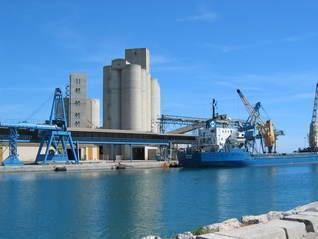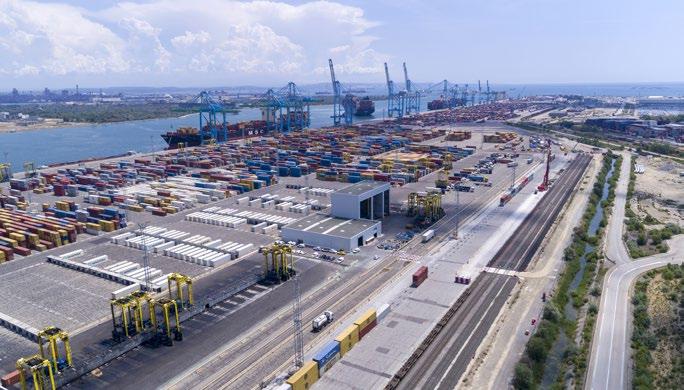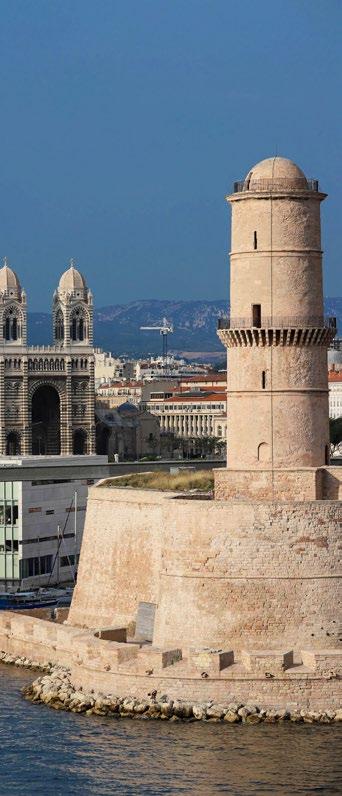





This year Bulk Terminals 2025 is being held in Marseille at the Radisson Blu Hotel Marseille Vieux Port.
We are very grateful for the support of the Port of Marseille-Fos our host port for this year’s conference.
As the leading port in France, generating 43,500 jobs in the Bouches-du-Rhône department Marseille Fos is a global port with an infrastructure able to handle all types of traffic: hydrocarbons, liquid bulk, general cargo, passengers – and of course dry bulk. Thanks to its location which make it ideal for North-South and East-West trade – plus its excellent road, rail, river and pipeline connectivity – it is the gateway to Europe at the southern end of the French logistics corridor of Lille – Paris – Lyon – Marseille. The Port of Marseille Fos is made up of two harbours, each with very distinct features. The eastern harbour located in Marseille is a local port for goods and passengers. The western harbour is located in the industrial port area of Fos-sur-Mer, accessible to the largest ships and dedicated to major intercontinental flows. The western harbour is where bulk terminal activity is located. The solid bulk sector in Marseille Fos handles both the import and export of agri-food products such as cereals, as well as industrial bulk such as fertilisers, construction materials, clinker, iron or bauxite ores, alumina, peat, etc.
Bulk Terminals Marseille will feature a packed programme of presentations and case studies for delegates and experts from across the industry to share ideas and information.
‘Responding to the New Age of Chaos’ is the theme of Marseille. The fluid situation

surrounding the imposition of the tariffs imposed by President Trump – at whatever level they settle at – added to worldwide geopolitical tensions will continue to have a serious impact on bulk trade flows, both in terms of total volumes and trade routes. These two factors added to the normal operational challenges managers face will force many bulk terminals to make strategic adaptations to maintain, let alone increase profitability.
Our regular coverage of bulk markets, improving – or at least maintaining –profitability, streamlining operations, improving safety, online security, plus ensuring environmental compliance and protection will be examined against the backdrop the volatile environment bulk terminal managers now have to operate in. Marseille will examine the impact these latest challenges place on bulk terminal operations – both in the short and long term. An additional challenge port and terminals will have to face in the not so distant future, is the impact on their infrastructure of rising sea levels caused by climate change. This is a subject we have wanted to address for some time and will also be covered.
The Annual ABTO Bulk Terminals Conferences are designed for all those involved in the transportation, storage and handling of bulk commodities. As well as terminals and ports we welcome equipment and service suppliers, professional advisors and academics to the conference. Indeed, ABTO feels strongly it is only through the interaction with these others that bulk terminals will achieve increased the operational efficiencies, better security, safety and environmental compliance they need to achieve.

Simon Gutteridge, Chief Executive, ABTO Mike Bradley, Director, The Wolfson Centre
There will be plenty of opportunities for that interaction. Ample time is provided to network during the course of the conference proper during breaks and discussions. Additionally, there is the relaxed and convivial atmosphere of Ice Breaker Drinks in the bar of the Raddison Blu for arrivals on the evening before the event starts and then the Conference Reception at the end of day one.
Both of these provide the perfect opportunity renew old friendships and make new ones. A further valuable networking opportunity is afforded by our traditional terminal visit on the afternoon of the second day. Our thanks to SEA-invest for inviting us to visit their Caronte Terminal.
ABTO could not stage the annual Bulk Terminals conference without the support of our sponsors: igus, indurad, RAM Spreaders and the TT Club. Each of these will present an operational, environmental or safety perspective.
A big thank you to them, our host port of Marseille Fos and conference partner DsG consultants.
Together with our conference Chairman Professor Mike Bradley and ABTO Technical Director Ian Adams, I look forward to welcoming you all to Bulk Terminals Marseille in October.
Simon Gutteridge, Chief Executive, ABTO
KEY TOPICS
Impact on bulk markets of geopolitical tensions and the US tariff regime
The trade of iron ore in hectic times
Challenges making the transition to new bulk traffics
CASE STUDY: Operating a multi-bulk terminal
CASE STUDY: Developing infrastructure investments –adding value to operations in a logical and sustainability way
Making the transition to 21st century carbon free energy
Port and terminal resilience to climate adaptation
Protecting from cyber attack
Minimising risk, increasing safety


WHY ATTEND?
Understand the challenges the bulk terminal industry faces
Learn from the experts
Appreciate the needs of your customers
Join the discussion with industry peers, consultants and investors
Meet technology suppliers and find out how they can improve your compliance and efficiency
WHO SHOULD ATTEND?
BULK TERMINALS 2025 is the essential event for operational and technical directors, managers, business development and analysts from:
Bulk terminal operators
Port authorities
Mining companies, commodity producers and traders
Shippers
Ship owners, operators, charterers, managers and barge companies
Logistics, brokers and forwarders
Materials handling engineers
Equipment and service providers
Government and regulators
Terminal developers
Ports and construction consultants
Finance Insurance and P&I
Lawyers
BE INVOLVED AS A PARTNER
Attending this event as a partner – exhibiting or sponsoring – will give you the opportunity to showcase your technologies, services, solutions and products to some of the most respected leaders in the bulk terminals industry. It’s the ideal way to enhance your company profile and communicate effectively with your target audience.
BENEFITS OF SPONSORING
Increase awareness of your product or service
Showcase your product or service to potential buyers
Benefit from greater market exposure to key purchasing influencers For more information, please call +33 (0)321 47 72 19 or email events@bulkterminals.org
18:00 Ice Breaker Drinks
CONFERENCE DAY ONE: WEDNESDAY 29 OCTOBER 2025
08:15 Registration and refreshments
OPENING WELCOME ADDRESSES
Welcome from ABTO
09:00
Simon Gutteridge, BA Law (Hons), FIMarEST, Chief Executive, ABTO
Conference Chairman’s opening remarks
09:05
09:15
09:25
Professor Mike Bradley, BSc Hons, PhD, Director, The Wolfson Centre for Bulk Solids Handling Technology, University of Greenwich; Chairman, Solids Handling and Processing Association (SHAPA) and the ABTO Members’ Advisory Panel
Welcome from the Port of Marseille Fos
Hervé Martel, CEO & Chairman of the Executive Board, Port of Marseille Fos
BULK MARKETS
Geopolitical tensions impacting the global bulk trade
Both on land and at sea, the international geopolitical context has deteriorated significantly since the war in Ukraine and the war in Gaza. The maritime extension of these conflicts has resulted in a substantial increase in the threat at sea in several maritime areas and strategic choke points through which international maritime trade flows. In this deteriorating security context, bulk carriers have been and continue to be potential targets, due to the geographical location of the shipping routes they use in the Red Sea and Black Sea and the type of goods they carry. This results not just in rerouting and delays but possible changes in the choice of unloading and loading terminals.
Bulk carriers in the deteriorating maritime geopolitical context
Black Sea and bulk carriers: export of Ukrainian production exposed to missile and mines threats
The Red Sea: What threat hangs over bulk carriers, from the start of the Houthi campaign in late 2023 to the sinking of the bulk carriers ETERNITY C and MAGIC SEA in July 2025
Impact on bulk terminals
Louis Borer, Senior Analyst, Risk Intelligence A/S
Impact on bulk markets of the US tariff regime
As the Trump Administration launched tariff regimes on several of its trading partners, its partners retaliated, and a new era of trade wars sent shock waves through the markets. One example directly impacting the shipping industry was the United States Trade Representative (USTR) imposing fees on Chinese-built ships owned or operated by Chinese entities calling at US ports. For the dry bulk market, the implications of the trade wars are potentially significant. Greater volatility and changing trading patterns could lead to increased tonne-mile demand. These issues and more will be addressed in this fluid topic.
09:50
Volatility caused by the ongoing tariff war between the US and other nations has impacted the global markets.
In the short-term global tariffs will restrain demand as a wait to see¨ approach is taken, before decisions are made on possible trade shifts to minimise their impact.
In the longer term, these tariffs will prompt a strategic redirection of trade routes, increasing shipping distances, in turn impacting the dry bulk industry.
Sean Fairley, Principal Consultant, Drewry
10:15
The trade of iron ore in hectic times when countries are protecting their steel industries
Although the steel trade has always been a contentious issue, the US’s imposition of high tariffs has exacerbated tensions in the sector like never before. A key question is whether the steel conflict is having an impact on the iron ore trade, given that around 98% of global iron ore production is used for steel production. In other words, are the clashes ‘downstream’ having an impact ‘upstream’? Based on the analysis of the latest available data for these two products, as well as the latest measures taken by major countries, this talk will therefore:
Summarise the pattern of steel trade and highlight any key recent changes.
Summarise the pattern of trade in iron ore and highlight any key recent changes.
Conclude whether the heated rhetoric on steel threats is having repercussions for the global iron ore trade.
Pablo Rodas-Martini, Director of Market Intelligence, Emerging & Frontier LLC
Changing patterns of the coal trade
Despite several countries around the world turning away from coal as an energy source, it remains a key seaborne dry bulk commodity, accounting for around 25% of dry bulk shipments in 2024 (by weight). Nevertheless, trading patterns shift and the outlook for the trade in general depends on the balance of a few key factors.
10:40
An overview of the coal market for the past year
Causes of volatility in trade
Our view of the next few years
Outlining of risks to this view
Will Tooth, Senior Drybulk Analyst, SSY
11:05 Refreshments
Circular biocarbon – the easiest pathway to substitute fossil carbon in all coal applications
11:35
Biocarbon products represent a 6,000-year success story, now perfected for maximum efficiency. The sector established optimised processes that minimize material and energy waste, ensuring an optimised mass and energy balance. Circular Biocarbon offers an easy pathway to replace fossil carbon across all coal applications—including power, processing, reduction, and anode production—and can permanently sequester atmospheric carbon. While primarily used as a coal substitute for energy, it is increasingly applied in processing industries and as an intermediary for further processing such as liquefaction and SAF. With numerous technology providers in the market, the number of industrial-scale plants is rapidly growing.
The full array of products from pyrogenic treatments
Technological processes and pathways for biocoal, biochar and biocarbon
Use cases and market outlook in steel production, renewable power generation and carbon removal market
Lisa Schmidt, Secretary General, International Biomass Torrefaction and Carbonisation Council (ITBC)
12:00
Overview of cementitious trade
Cement and clinker are generally classified as minor bulk commodities. However, cementitious materials extend beyond these two products to include other binders and supplementary materials such as granulated slag and fly ash. Their international trade is closely tied to global economic growth and demographic trends. The Mediterranean region remains one of the world’s major exporting hubs, while Europe continues to play a central role as an importing market.
Over the past five years, two major factors have reshaped cementitious trade flows: the industry’s drive toward decarbonisation and the geopolitical and economic turmoil around the Mediterranean Rim. These shifts in cementitious trade are also influencing regional port activity.
Trends in cement and clinker trade over the past decade
Key exporters and importers worldwide and in the Euro-Mediterranean region
A focus on cement, clinker, and SCM trade in the Euromed area
The impact of decarbonization strategies on trade flows
Recent shifts and expected developments in regional supply chains and port logistics of these cement related products
Sylvie Doutres Ghizzo, Associate & Joint Managing Director, DsG Consultants
Grain markets
Grain markets have experienced a turbulent few years, with 2025 turning out to be no different.
Trump’s trade war has added a fresh round of uncertainty, especially for the prospects of the seasonal 4q US-China soybean trade. While trade war developments make headlines, structural changes appear to be taking place in global grain markets, affecting terminal throughput.
12:25
Trump tariffs and US-China trade
The shift to South America
Chinese agricultural self-sufficiency
Russia/Ukraine developments amid ongoing war
Cara Hatton, Dry Bulk Analyst, SSY
12:50 Q & A and discussions
13:00 Lunch
14:00
OPERATIONS
Challenges making the transition to new bulk traffics
Decarbonisation and deindustrialisation across Europe have significantly reduced traditional major bulk traffics in ports. This decline has translated into lower revenues for port authorities and dry bulk operators, driven by the sharp drop in coal and iron ore volumes. The key questions now are: how can this revenue gap be addressed? Which emerging products might replace coal and iron ore in the future, and what would be the implications for port infrastructure and operations?
Through CASE STUDIES from France, Spain, and the Netherlands, this presentation will explore possible answers and highlight practical solutions.
Substituting coal and iron ore with alternative traffics
Optimizing the use of newly available port space
Leveraging deep-sea berthing facilities more effectively
Key take-aways and conclusions
Sylvie Doutres Ghizzo, Associate & Joint Managing Director, DsG Consultants
14:25
Efficiency versus flexibility – how to choose in a time of turbulence in trade patterns?
Times are turbulent. Unpredictable tariffs, trade wars, real wars, climate change affecting agricultural productivity, rising sea levels - all these things put uncertainty in our calculations of what will be traded and where in the future. At the same time there are some things that are more or less certain - people will need to eat, and we’ll need steel for making things, be they bean tins or guns.
These matters should factor into our forwards planning for port investment. This presentation seeks to provide some food for thought about how this conundrum can be examined and a sensible strategy for hedging of bets to be developed. A few key issues:
Port infrastructure investment has a 30 to 50 year time horizon
In that timescale, it’s highly likely that what you’re handling now, will change in ways you wouldn’t even be able to imagine today
On that basis it makes sense to build in flexibility in equipment choice
But the down-side is that flexibility costs more money and often compromises efficiency, environmental emissions and economic performance.
Professor Mike Bradley
CASE STUDY: Operating a multi-bulk terminal
The port of Caronte has a century-long history. It was originally established to handle coal, due to pollution and space constraints at the main port of Marseille.
Over time, the port has transformed from a single-product import facility into a versatile hub for handling a wide variety of goods for both import and export. This change was supported by the introduction of dedicated and custom-built infrastructure, including silos and warehousing.
14:50
This significant transformation was driven by several key changes, including the modernisation of handling equipment and facilities, rigorous training for technical and operational staff, the careful management of different bulk materials coexisting at the site, and a strong commitment to meeting environmental standards.
A century of history at the port of Caronte
Modernization of handling equipment and facilities
Maintaining the integrity of products, vessels, and the port itself
Adherence to environmental standards and adapting to changes
Focus on flexibility and agility
Sylvie Collange, Chief Executive Officer, SEA-invest Caronte Terminal, Marseille Fos
15:15 Refreshments
Business development playbook for dry bulk terminals
15:45
Changing macroeconomic conditions and an evolving regulatory landscape on sustainability are reshaping global raw material flows and accelerating the transition towards greener supply chains. For bulk terminal operators, this shift opens new opportunities while making business development a critical function to secure sustainable revenue streams in the future. This session will explore how to identify opportunities, screen and qualify pipelines, and move effectively from an idea to a final investment decision (FID), highlighting the common pitfalls at each stage. We will close with an interactive Q&A to exchange knowledge and best practices.
Evolving macro trends, the sustainability transition, and the impact on bulk operators
Business development as a driver of long-term growth
From opportunity identification to FID – steps and pitfalls
Interactive Q&A and knowledge sharing
Firas Ezzeddine, Chief Commercial Officer, HES Med Terminals
16:10
Smart berth planning – benefits of minimising idle time
Smart berth planning can markedly reduce vessel idle time and streamline cargo handling. This session examines how HANSAPORT in Hamburg harnessed berth planning and how Marsa Maroc in Casablanca leveraged real-time port call coordination, alongside just-in-time arrival alerts, to optimise resource allocation and cut waiting periods at the berth. We also explore the role of transparent, cross-stakeholder communication in aligning schedules and leave you with practical strategies to boost berth utilisation and minimise idle hours
Just-in-time arrivals enable terminals to better plan resources and reduce waiting periods at the berth
Transparent communication among stakeholders helps align working schedules and supports more coordinated port operations
CASE STUDY: Smart berth planning has reduced vessel idle time and improved cargo handling flow at HANSAPORT dry bulk terminal, Hamburg.
Attendees will take away practical tips to improve berth utilisation and cut down on idle time
Jan Cantow, Co-Founder, Heyport
Leveraging smart diagnostics and predictive analytics to streamline maintenance and ensure operational continuity
16:40
17:05
Modern bulk handling systems are under pressure to maximise availability while minimising maintenance costs. The presentation shows how intelligent sensor technology and databased analysis methods automate condition monitoring and optimise maintenance processes. Practical examples will be used to explain how predictive diagnostics help to avoid unplanned downtimes, extend maintenance cycles and sustainably increase operational reliability.
Condition monitoring & predictive maintenance in bulk handling
Utilising predictive analytics to streamline maintenance
Benefits of ensuring operational continuity
Richard Habering, Head of Business Unit, igus Smart Plastics
Real-time volume and quality tracking from warehouse to terminal
The implementation of a radar-based solution for real-time volume and quality tracking from warehouse to terminal enables the enhancement of port operations in challenging high-dust environments. This technology addresses the complexities of monitoring diverse materials for multiple users.
Enables precise volume measurement and material flow tracking despite dust interference
Supports adaptation to new product types and user requirements
Drives investment in advanced technology for future port resilience
Dr Christian Augustin LLM, Managing Director and Julien Pierre, Regional Sales Manager, indurad GmbH
17:30 Q & A and discussions
17:45 Chairman’s conclusions and close of day one
EVENING SESSION
18:00 Conference Reception
CONFERENCE DAY TWO: THURSDAY 30 OCTOBER 2025
08:30 Refreshments
Conference Chairman’s opening remarks
09:00
Professor Mike Bradley
09:05
09:30
09:55
ENVIRONMENT
Implications for bulk terminals when a deep-sea port powered by 20th century fossil fuel makes the transition to 21st century carbon free energy
Decarbonising one of France’s main industrial areas impacts the Port’s former pure bulk import terminal. The Terminal Multi-Vracs of Fos (TMF), originally dedicated to coal and bauxite import is adapting to new traffic with the development of low carbon emission industrial plants nearby. After a quick overview of the Port of Marseille Fos and its traffic, we shall focus on bulk and how the ongoing transformation of the local industry offers perspective and opportunities. The TMF is part of the undergoing industrial revolution.
Port general overview
History of Fos Industrial Zone (FIZ) seen from the bulk terminal
Decarbonising FIZ – a field of opportunities
Mark Lazzaretto, Solid Bulk Sector Manager and Industry & Decarbonisation Manager, Port of Marseille Fos
Particulate emission control
There are many problems with current bulk handling logistics, such as dust generation from the various transfer points at a mine or handling facility to the final destination and extended exposure to harmful airborne pollutants. In some situations, containerised bulk handling (CBM) offers solutions to these environmental problems and for some for some commodities definite operational advantages.
Problems with current bulk handling logistics
Other methods to help reduce dust particulates and environmental impact
Situations where CBH is the way forward in reducing particulate emissions
Frank van Laarhoven, Senior Sales Manager Europe, RAM Spreaders
Port and terminal resilience to climate adaptation
Modern ports and terminals face an increasing range of climate change related challenges, including rising sea levels, extreme weather events, heat stress, and increased flood risks. These events threaten critical infrastructure, disrupt supply chains, and expose the interdependencies between spatial planning, logistics, and operational continuity. As gateways for global trade and hubs of economic activity, ports and terminals must actively strengthen their climate resilience to remain competitive and reliable in a rapidly changing environment. This presentation deals with the risks and shows mitigation measures for ports and terminals.
Dealing with climate change in the port sector
Risks and solutions for ports and terminals
Planning and implementation
Anthony van der Hoest, Global Solutions Director – Resilient Ports and Maritime Transportation, Arcadis
10:20 Q & A and discussions
10:35 Refreshments
CYBER SECURITY, SAFETY & RISK
Update on the latest cyber threats
Presentation will share real-world insights into how bulk terminals can strengthen their cyber defences while keeping operations running smoothly. Expect practical strategies, lessons from the field, and a clear roadmap for reducing risk in today’s high-threat environment.
11:05
Update on cyber threats affecting maritime and port operations
Practical strategies for reducing cyber risk in port and terminal operations
How to meet compliance without slowing operations
Lessons learned from securing global offshore and bulk terminal projects
Richard Hodder, Managing Director & Principal Cybersecurity Consultant, Engage Cyber
11:30
CASE STUDY: Marseille Port’s response to cyber threat
Protecting the Port of Marseille-Fos against cyber-attacks involves understanding what an IT system is, the types of possible attack, how the attack takes place, and what organisational and technical measures to take. The presentation addresses the protection of maritime, land and computer access, risk management, attack processes, the typology of attacks, the cyber organisation, and the technical responses. It highlights the importance of cyber risk awareness and best practices to maintain security and responsiveness in case of a major crisis.
How to appreciate and manage cyber risks
The typology and process of cyberattacks
The measures taken by the Port Authority of Marseille Fos – organisational, technical and good practices of employees
Paul Franquart, Chief Information Security Officer, Port Authority of Marseille Fos
Minimising risk, increasing safety
This session will begin with an overview of the types of port-related claims commonly encountered at TT Club. These include incidents such as fires, cargo contamination or mixing, bodily injuries, and miscommunication between stevedores and vessel crews. Each of these events can have significant operational and financial consequences, and they highlight the complex risk landscape faced by port operators. A key – yet often overlooked – aspect of effective risk management is the proactive reduction of potential consequences following an incident. While much attention is given to prevention, the mitigation of impact plays a crucial role in limiting disruption and liability. Following this overview, current innovations in port skills and safety gathered by the Club’s Loss prevention Team from recent industry developments with the aim of supporting safer and more resilient port operations, will be presented.
11:55
Examples of port related claims: crisis management and mitigation strategies
Bodily injury incidents involving port personnel, third parties or crew
Cargo contamination or mix-ups during handling
Fires occurring in storage areas or during operations
Improper cargo handling leading to damage or operational delays
Loss prevention
Recent technological and procedural advancements aimed at improving safety and efficiency in port operations
Practical tools, recommendations, and training developed to support risk reduction and incident
Géraldine Savin, Senior Claims Executive, TT Club
12:20 Discussion and questions
12:40 Chairman’s summary of conference deliberations
13:00 Lunch
TERMINAL VISIT
14:00
Terminal Visit: SEA-invest Caronte Terminal, Marseille Fos
16:30 Close of conference and return by coach to central Marseille
The programme is subject to change. For the most up-to-date and detailed programme for this event, please visit bulkterminals.org/events

Dr Christian Augustin LLM, Managing Director, indurad GmbH
After Christian Augustin completed his Masters in Philosophy and History in 2006 he worked for an innovative start-up for the creation of new metallic structures and provided consultancy services to other OEM for product development and market placement. In 2015 he received his PhD for Innovation and Invention Science, comparing best practices in different industries and creating a theory of innovation. In 2009, Christian co-founded indurad, with responsibility for solution development; sales, partner and subsidiary handling in the Americas and Asia; as well as QHSEC.
He has worked on many projects around the world and in all kind of mining and bulk material handling, from pre-sales until project hand over. Christian was the driver behind the stockpile automation projects in Brazil and the ship loader automation projects in Canada.

Louis Borer, Senior Analyst, Risk Intelligence A/S
Louis Borer is a senior analyst at Risk Intelligence. Before, he worked for over six years for the French Ministry of the Armed Forces in the field of GEOINT and maritime arms trafficking, then as a senior analyst in maritime counterterrorism. Louis has also worked on maritime security issues for various think tanks such as the Asia Centre.
At the same time, he is a reserve captain in the French Navy, where he has worked for military and naval intelligence, and special forces.
Louis holds a master’s degree in geopolitics from Sorbonne-Paris1/ENS, where his research focused on maritime piracy in Southeast Asia and drug trafficking at sea in the Caribbean.

Professor Mike Bradley, BSc Hons, PhD, Professor of Bulk and Particulate Technologies, The University of Greenwich; Director, The Wolfson Centre for Bulk Solids Handling Technology; Chairman, Solids Handling & Processing Association (SHAPA) and ABTO Members’ Advisory Panel
After doing an apprenticeship with BAE Systems, Mike took a first degree at Thames Polytechnic and after a while working in Flight Automation Research Laboratory at BAE, he returned to Thames Polytechnic to do a PhD in Design Methods for Pneumatic Conveying systems. After his PhD he failed to reach escape velocity from The Wolfson Centre, becoming first a consultant, then Manager and finally Director in 2000. He was elevated to the status of Professor in 2006. Mike also has a small business in property, and co-founded WorkSafe Design, a company developing advanced PPE for infectious disease protection. In his spare time Mike is a competition dancer, and has qualified to compete in national events on more than one occasion in both ballroom and Latin American disciplines.

Jan Cantow, Co-Founder, Heyport
Jan is the co-founder of Heyport. He brings over a decade of hands-on experience in port logistics and maritime operations. Jan began his career managing container trucking and intermodal transport before spending seven years as a vessel coordinator at the Port of Hamburg, where he mastered berth planning, cargo flows and stakeholder engagement. At heyport, Jan leverages this deep industry knowledge to drive just-in-time port call planning solutions that boost operational efficiency and significantly reduce greenhouse-gas emissions. A firm believer in sustainable shipping, he leads strategic partnerships and shapes product vision to help ports and terminals achieve digital maturity and interoperability. Outside of work, Jan is an avid sailor and serves as a volunteer firefighter, combining his love for the sea with a strong commitment to community service.

Sylvie Collange, Chief Executive Officer, SEA-invest Caronte Terminal, Marseille Fos
Sylvie has held various executive positions with the Sea Invest Group since 2005. Currently, she is CEO of Sea Invest Caronte multi-bulk terminal in Martigues (Marseille Fos). The terminal focuses on high valueadded industrial bulk products with dedicated and customised facilities, including silos and warehousing. Before to her current CEO role, Sylvie was CEO of Carfos terminal (a previous part of the Sea Invest Group) until June 2025. Carfos located in Fos sur Mer is a multi-bulk terminal.
Prior to Sylvie’s CEO roles in the Sea Invest Group she was CFO for these two companies and Sea Tankers (also a member of the Sea Invest Group) a small tanker shipowner and operator with major oil companies. Before joining the Sea Invest Group, Sylvie launched her professional career as a financial consultant for PriceWaterhouse Coopers audit firm in 1999.

Sylvie Doutres Ghizzo, Associate & Joint Managing Director, DsG Consultants
Co-founder of DSG Consultants in 2011, Sylvie Doutres Ghizzo has more than 35 years of experience as senior consultant in the port sector. Specialized in port intelligence, trade flow analysis, and industrial dry bulk supply chains, she advises public and private stakeholders across Europe and the Mediterranean. DSG Consultants is particularly recognized for their expertise in cement and supplementary cementitious materials (SCMs) trade flows and Euro-Med port markets.

Firas
Ezzeddine, Chief Commercial Officer, HES Med Terminals
Firas is the Chief Commercial Officer at HES France, where he is responsible for commercial and business development activities. He led the acquisition of the Darse 1 concession in Fos-sur-Mer and now oversees customer engagement, market development, and project growth initiatives in the dry bulk terminal sector.
A Lebanese national with an academic background in finance, Firas built his career in strategy across consulting and corporate roles, including positions at Roland Berger and Philips before joining HES International.
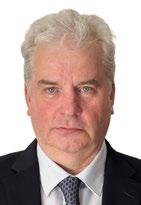
Sean Fairley, Principal Consultant, Drewry
Sean has over 25 years of experience in the shipping industry in the areas of finance and consultancy, working in locations such in London, Amsterdam and Singapore. At present, he is acting as a Principal Consultant at Drewry Shipping Consultants Ltd.
Prior to joining Drewry in 2022, other roles included as a Senior Credit Officer at DVB Bank, Shipping Credit Analyst at MRC Business Information Group, in Research & Operations at Petrian Shipbrokers – as well as a previous time at Drewry a Shipping Market Analyst

Paul Franquart, Chief Information Security Officer, Port Authority of Marseille Fos
Paul is an IT engineer. He is the qualified authority in information systems security at the Port of Marseille-Fos, responsible for managing ISS projects in collaboration with the Ministry of Transport and the National Agency for Information System Security.
In his IT security management role Paul oversees the application of laws and regulations relating to the security of port information systems, drafts security policies and procedures, and manages audits and penetration tests.
Paul’s certification and data protection role involves acting as a PKI certification authority and data protection delegate for the Port of Marseille-Fos.
He founded a group of port cybersecurity officials to strengthen coordination on security issues for the SSI Observatory Marseille-Fos.
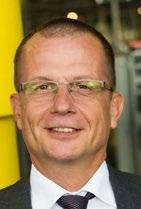
Richard Habering, Head of Business Unit igus Smart Plastics, igusGmbH
Richard Habering has been an integral part of the Igus® family for more than two decades, significantly contributing to the successful development and marketing of innovative products. His career began in 2000 in sales for chainflex® cables, followed by his role as Product Manager for ReadyChain from 2002 to 2004, driving customised system solutions.
From 2004 to 2006, he combined his expertise in product management with strategic sales leadership for Triflex robotic solutions. From 2006 to 2018, Richard focused on product development and strategy for chainflex®, further solidifying its position as a global leader in durable cable solutions. Since 2018, he has been heading the Business Unit “Igus® smart plastics,” shaping the future of condition monitoring (iSense) and predictive maintenance. Richard Habering is a pioneer of smart technologies that enhance machine uptime and revolutionize industrial automation.


Cara Hatton, Dry Bulk Analyst, SSY
Cara has worked as a Dry Bulk Analyst at SSY since January 2023, covering all sectors of the dry bulk market. In this role, she writes regular reports, presents on shipping markets and forecasts dry bulk trade. Before her role at SSY, Cara completed a masters in Economics and an undergraduate degree in Politics and International Relations.
Richard Hodder, Managing Director & Principal Cybersecurity Consultant, Engage Cyber
Richard is a cybersecurity consultant specialising in securing critical infrastructure, operational technology (OT) and maritime systems. With over 20 years of hands-on experience across IT and OT environments, he has delivered projects for some of the world’s largest industrial, energy, and maritime organisations, including offshore wind farms, shipping lines and global manufacturing plants. As Managing Director of Engage Cyber and he leads complex security audits, compliance programmes and incident response planning, often in high-risk and highly regulated environments. His expertise spans IEC 62443, ISO 27001 and Cyber Essentials, with a pragmatic, riskbased approach to safeguarding systems. Known for translating complex security issues into clear, actionable solutions, Richard has worked globally - from Europe to Asia - helping clients reduce risk, build resilience and stay ahead of evolving cyber threats.

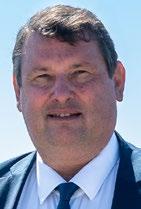


Mark Lazzaretto, Solid Bulk Sector Manager and Industry & Decarbonisation Manager, Port of Marseille Fos Mark is food science engineer. For the last year and half he has held the position of Industry and Decarbonisation Head at the Port of Marseille Fos, in addition to be being the Dry and Liquid Bulk lead for the past four and a half years. Prior to this he spent ten years as a Business Developer, then Industrial and Logistics Projects Lead. With his team, he is in charge of developing dry and liquid bulk traffics supporting the decarbonisation strategy and commercially developing industrial projects within the port’s industrial area.
Hervé Martel, CEO & Chairman of the Executive Board, Port Authority of Marseille Fos
Hervé has been a General Engineer of Bridges and Roads since 1989. He holds a DEA in Transport Economics and a Master’s degree in Public Management. He began his career at the Port of Réunion and has held various management positions, including at the Autonomous Port of Paris, the Departmental Directorate of Equipment of Seine-et-Marne, and the office of the Minister of State, Minister of Ecology, Sustainable Development and Planning. In 2009 Hervé was appointed Director General of Ports of Paris, then of the Port of Le Havre in 2012. Since 2019, he has been Chairman of the Executive Board of the Grand Port Maritime de Marseille.
Julien Pierre, Regional Sales Manager, indurad GmbH
Julian is a committed professional with over five years of experience in sales. Presently, he held the position of Regional Sales Manager at indurad, a role assumed in January 2023, following a one-year tenure as Inside Sales. Julian’s career commenced with a student assistant position at indurad and an internship at a local engineering firm. He is a graduate of RWTH Aachen University, holding an MS in Management, Business and Economics (2017-2021) and an MS in Mineral Resource Engineering (2016-2019), with a focus on mineral processing, recycling, and sustainability.
Pablo Rodas-Martini, Director of Market Intelligence, Emerging & Frontier LLC
Pablo is a maritime expert and influencer who writes high-quality, technical content for European maritime companies. He is Vice President and Director of Market Intelligence at Emerging & Frontier LLC. Previously, he was Chief Economist at the Central American Bank for Economic Integration (CABEI) and an advisor to the Inter-American Development Bank (IDB). Pablo holds a PhD and an MSc in Economics from Queen Mary and Westfield College, University of London.

Géraldine Savin, Senior Claims Executive, TT Club
Géraldine is a French qualified lawyer with two Master’s degrees in French Law from France and an LLM in International Trade and Maritime Law from the UK. She began her career in the maritime industry in 2008 at a cargo recovery agency, focusing on casualty claims management. Géraldine later joined TT Club as a Claims Executive, handling claims related to logistics operations, ship operators, ports and cargo handling facilities.
After several years in claims management, she worked briefly as Legal Counsel at an insurance company, involved in drafting and reviewing insurance wording, terms of business agreement and ensuring regulatory compliance. Géraldine’s experience covers both operational and legal aspects of the maritime and logistics sectors, with a focus on claims handling and legal risk assessment.

Lisa Schmidt, Secretary General, International Biomass Torrefaction & Carbonisation Council (IBTC)
Lisa brings along a broad experience in communications strategy and brand development from various industries. She holds a master’s degree from the University of Vienna in cultural studies and an MBA from WU Executive Academy Vienna. In 2023 she completed an executive program for “Circular Economy & Innovation” at the Vienna University of Applied Sciences.

Will Tooth, Global Head of Research, SSY
Will has been a Senior Analyst on the dry bulk research desk at SSY since May 2024, having spent the previous three years in a trading and research lead role at a dry bulk futures focused fund. Overall his career spans 11 years in the commodities space including time spent in risk at Engelhart and as an analyst at MSI, a maritime research consultancy. Will holds a Masters degree in Mathematics and Philosophy from Oxford University.

Anthony van der Hoest, Global Solutions Director - Resilient Ports and Maritime Transportation, Arcadis
Anthony is a senior port expert and Global Solutions Director Resilient Ports at Arcadis. Prior to joining Arcadis, he was Commercial Director for South Europe and Africa at Van Oord – one of the largest dredging firms in the world.
Prior to joining Van Oord Anthony was a Director at MTBS – a port finance, port strategy and master planning boutique consulting firm. In that role he was responsible for business development, as well as project delivery and management.
He has over 20 years of experience in the ports and maritime sector and holds a Civil Engineering degree from Delft University of Technology. He has worked on more than 50 feasibility studies, master plans in ports and port logistics assessment including projects in the US, Brazil, Netherlands, Belgium, Spain, Tanzania, Kenya, Nigeria, Georgia, Azerbaijan, Turkey, Israel, India, UAE, Kuwait, Saudi Arabia and others. Anthony has significant experience in various senior management and business development roles at Port of Amsterdam, Terminal Investment Ltd (TiL-part of MSC) and Samskip.

Frank van Laarhoven, Senior Sales Manager Europe, RAM Spreaders
Before joining RAM, Frank studied electrical engineering and gained experience in the overheight crane industry before moving into the port sector in the 1990s. He advanced to a senior management role with a spreader manufacturer and later transitioned into sales. Since joining RAM, Frank has been instrumental in supporting customers worldwide, not only through sales but also by assisting with commissioning projects and delivering both practical and theoretical on-site training as part of RAM’s after-sales service.
Registration
BULK TERMINALS 2025 MARSEILLE
29-30 October 2025 : Radisson Blu Hotel Marseille Vieux Port
TWO EASY WAYS TO REGISTER
1 Online: www.bulkterminals.org/events/event-registration
2 Email: events@bulkterminals.org
REGISTRATION FEES
ABTO Members £1,200 + VAT
*Non-Members £1,400 + VAT
DISCOUNTS AVAILABLE FOR GROUP BOOKINGS
Contact Simon Gutteridge +33 (0)321 47 72 19 or events@bulkterminals.org
* For details of how join ABTO and its benefits, including reduced conference fees, please visit: www.bulkterminals.org/membership
On receipt of your registration we will email an invoice with details of payment, which is due immediately, together with details of specially negotiated hotel rates.
Cancellations
Cancellations of a registered place must be received in writing no later than 14 days prior to the event. A charge of £100 + VAT will be made for cancellations received before this date, but it is regretted that no refunds will be issued after this date. However, substitute delegates are welcome.
Great conference, good programme and networking – met some useful people.
Fergal Buttimer, Buttimer Engineering
Thank you for a great convention with many interesting presentations and discussions.
Kristoffer Alm, BRUKS Siwertell
I think you cover most if not all the relevant topics that need discussing and would not add anything to them. As far as I’m concerned – you’re doing an excellent job
Stewart Boyle, Liebherr
The strong point is the mix of operators, suppliers and service providers
Ekke Oosterhuis, Royal HaskoningDHV
Made some very good contacts – the perfect niche event. Relaxed, intimate atmosphere and the programme gave me a good insight into our terminal customers’ needs – we will be back
Mark Smith, igus
I attended the last three conferences. It was a wonderful opportunity to meet and to share experiences with so many interesting people involved in dry bulk terminal issues. Always learning and exchanging new ideas I would definitely recommend.
Cristian Valenzuela, Puerto Panul














